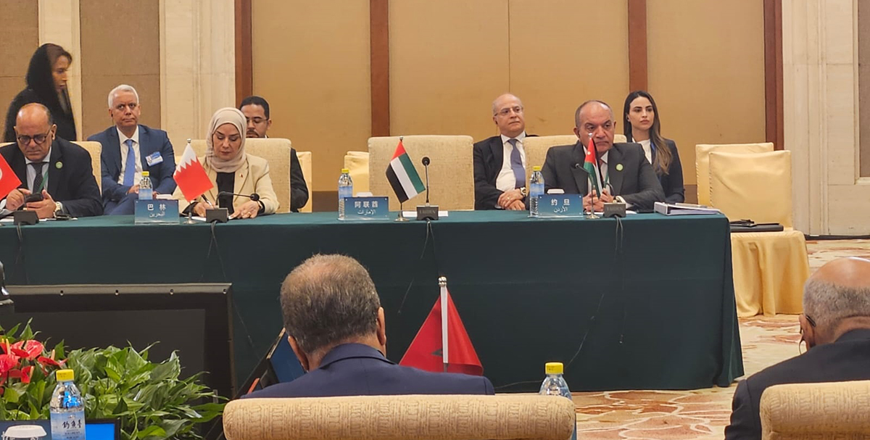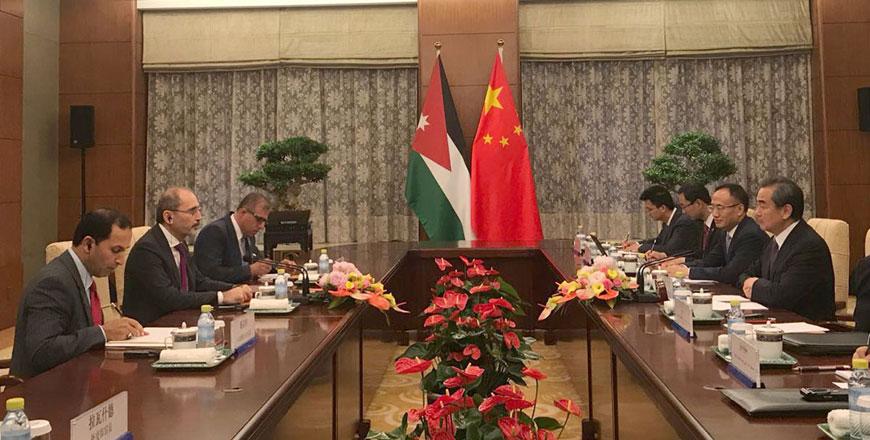You are here
Arab states ‘essential’ for success of One Belt, One Road — experts
By Mohammad Ghazal - Apr 16,2019 - Last updated at Apr 16,2019
SHANGHAI — Chinese and Arab experts weighed in on China’s “One Belt, One Road” initiative on Tuesday, saying it would play a key role in achieving desired development and prosperity in the Arab world, including Jordan, by focusing on boosting development.
The initiative was proposed by Chinese President Xi Jinping in 2013 with the aim of building a trade and infrastructure network to connect Asia, Europe and Africa along the ancient Silk Road trade routes.
Experts, who have gathered in Shanghai for the second Arab-Chinese Forum on Reform and Development, said the massive undertaking would strengthen Sino-Arab relations in fields of commerce, culture and other areas.
“The One Belt, One Road initiative is of key importance for enhancing Chinese-Arab relations in several arenas... Ties between China and the Arab world are growing at a rapid pace,” said Li Chengwen, ambassador of China-Arab States Cooperation Forum Affairs at the Chinese Ministry of Foreign Affairs.
“The initiative supports strengthening ties with Jordan and Arab economic development,” he added on the sidelines of the event.
In his address, he stressed that China supports Arabs and their causes, including the Palestinian issue, a central cause for the Middle East.
As of July 2018, more than 100 countries and international organisations have signed Belt-and-Road cooperation agreements with China, extending the initiative’s scope from the Eurasian continent to Africa, Latin America and the Caribbean, as well as the south Pacific region.
During the event, former Lebanese president Michael Suleiman stressed the significance of the initiative for supporting development in the Arab world.
“Arab states are essential for the success of this project as it focuses on infrastructure and energy projects,” Suleiman said.
Meanwhile, former Egyptian foreign minister Mohammad Fahmi stressed that cooperation under the initiative would not only benefit the economic and trade relations between China and the Arab world, but also other areas including science, culture and technology.
Jiang Feng, chair of Shanghai International Studies University Council, said many of the problems in the Middle East could be solved by focusing on and achieving development, in which the One Belt, One Road initiative could play a key role.
China is the second-largest trading partner for the Arab world, Khalil Thawadi, assistant secretary general of the Arab League, said, noting that trade exchange between China and Arab states reached $190 billion in 2017.
“The initiative is very important, and 21 Arab states signed memoranda of understanding as part of the initiative with China last year,” he said.
“The Arab world is a strategic partner for China in implementing the plan [One Belt, One Road],” the Arab League official said, adding that China is a strong supporter of the region’s stability, and that the Arab League supports the One China policy.
Majdi Abdul Aziz, a researcher at the Middle East Studies Centre, said the initiative would play an important role in creating much needed jobs in Jordan and boosting trade to create opportunities.
“Ties between China and Jordan are distinguished and this initiative would make ties stronger,” Abdul Aziz told The Jordan Times on the sidelines of the event.
“Jordan was among the first to start Arab-Chinese dialogue via the Arab Thought Forum [ATF],” said Hashem Kayed, deputy secretary general for cultural affairs at the ATF.
“China’s initiative to revive the cultural Silk Road began several years ago and aimed at restoring the spirit of peace, cooperation, tolerance and openness... between the two nations and peoples to make the bonds between those of the east and the peoples of the world stronger,” Kayed said.
‘Not a debt trap’
During the forum, Arab and Chinese officials rejected claims by several Western media outlets that the initiative dangerously increases the debt of countries participating in the plan, stressing the importance of debt management by countries in this regard.
They alleged that there were attempts by Western media to “tarnish the image of the initiative”, adding that a majority of the investments under the initiative were not only through loans but also through investments by Chinese companies and partnerships with other international organisations.
The participants said that the initiative aims to benefit the countries taking part in the plan, and it was important to focus on debt management as the debt itself is “not the core problem”.
At last week’s World Economic Forum on the Middle East and North Africa, Li, ambassador for China-Arab States Cooperation Forum Affairs, said “China is trying to find mechanisms to avoid a ‘debt trap’.”
The Chinese official added that no country to date has complained of falling into a “trap” of unsustainable Chinese loans.
“The Belt and Road initiative aims to increase the economic prosperity of a country. It does not aim at expanding the political and geographical authority of China in the world,” he said at the World Economic Forum.
Related Articles
AMMAN — Jordan's Permanent Representative to the Arab League Amjad Adaileh emphasised the importance of Arab-Chinese relations and their pos
AMMAN — Foreign Minister Ayman Safadi and his Chinese counterpart Wang Yi, who is also State Councillor, discussed means to enhance bilatera
AMMAN — China is keen on increased cooperation with Jordan and will continue to support development in the Kingdom, according to Zhang Haiha













